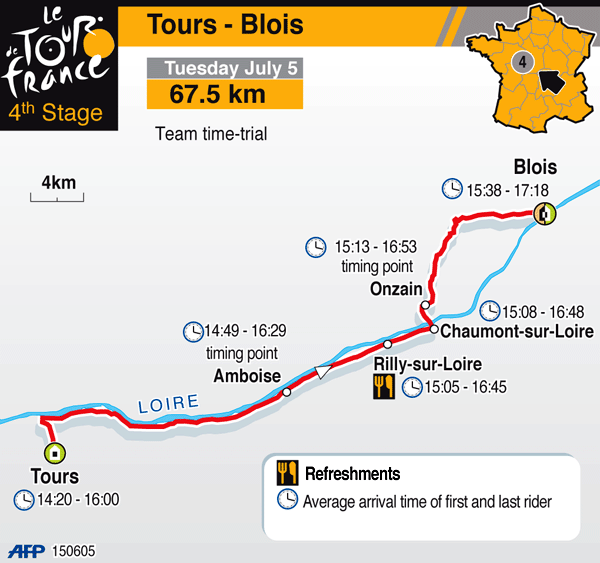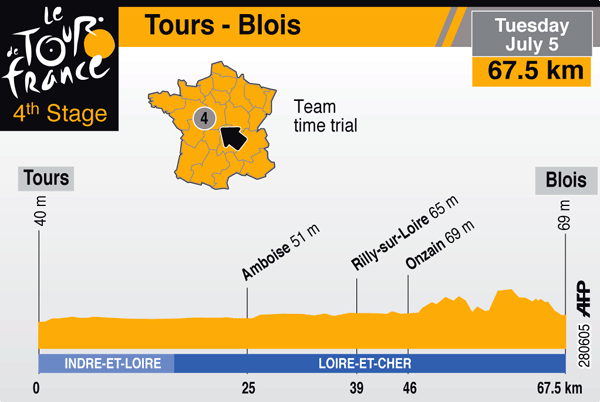
Recently on Cyclingnews.com |
92nd Tour de France - GT
France, July 2-24, 2005
Main Page Results Live report TTT Rules Previous Stage Next Stage
Stage 4 - Tuesday, July 5: Tours - Blois TTT, 67.5 km
Only three kilometres longer than last year's team time trial, this year's TTT follows either side of the River Loire for the better part of the stage, and once again looks perfectly suited to the powerhouse of Tour TTTs, Discovery Channel. With some rolling sections in the latter part of the course, the discipline and strength with which the Disco boys ride will come to the fore. Look to the fast and furious Phonak squad, led by Floyd Landis and Santiago Botero, to follow up their recent second placing in the Eindhoven Pro Tour team time trial competition, and CSC, who have been performing consistently so far after shooting out of the blocks early in the season. In 2004, US Postal excelled in the wet conditions as T-Mobile faltered in the rain - if it's dry in 2005, there won't be much separating the top teams on the clock in Blois. But without Russian veteran powerhouse Viatcheslav Ekimov, Discovery Channel may not be able to put the same amount of time into the field as they did in '04, leaving the door open for the in-form teams to shake it up - look for another surprise in the maillot jaune.
Those team time trial rules explained
By Roger Hughes
Just to make life easier for everybody, the Tour organisers last year introduced a new set of rules to determine how much time riders can lose on the team time trial stage. In previous years, there has been a simple ceiling - no rider who finishes inside the time limit could lose more than X minutes. This year the system is a little more complex. So here goes:
- The teams' times are taken on the fifth rider to finish, and all riders finishing together with their team are credited with that time. Riders who are dropped will be given their actual time, and there is a time limit of the winning team's time +25% to avoid elimination, which could be a tough call for a rider who gets dropped early; the rest of this spiel only affects the individual GC for riders who finish with their teams.
- The maximum amount of time that a rider who finishes with their team can lose to the riders on the winning team is determined by the placing of their team: riders in the team that finishes second can lose no more than 20 seconds, 3rd - 30 seconds, 4th - 40 seconds and so on in ten second increments down to the 15th team, who can lose no more than 2.30, and then in five second increments down to the 21st team whose riders can lose no more than 3 minutes. If the team finishes closer to the winners than the maximum, the riders get the actual team time. Still with me? Good.
- The actual team times are used for the overall team classification.
Now, as well as giving accountants something to do in their spare time, this system gives a little scope for slightly odd outcomes for the riders with a real interest in the general classification, particularly if the winners are a team without any serious GC contenders, since the limits are on what they lose to the winning team, not to each other. If, for example, Bouygues Telecom unexpectedly power ahead, with T-Mobile finishing second a minute down and Discovery Channel a couple of seconds slower still, Jan Ullrich would gain 10 seconds on Lance Armstrong, even though the actual difference between them was far less. And if another team finished between them, it would be 20 seconds difference, and so on (the reductio ad absurdum case would be if the teams in 2nd to 21st position finished separated by fractions of a second but more than 3 minutes down on the winners, in which unlikely event riders finishing in the same second could be credited with times up to 2.40 apart). So placings may well be as important as times here for the GC riders - they need to worry not only about each other but about the other strong time trialling teams as well.
Stage Map

Stage Profile

Images ©:AFP
